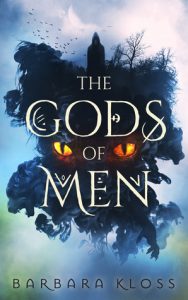The Gods of Men by Barbara Kloss (SPFBO Review)
T.O. Munro has stepped in on behalf of The Fantasy Hive to help out with the final stages of SPFBO 4!
SPFBO – aka the Self-Published Fantasy Blog-Off – is a contest organised by Mark Lawrence with the aim of celebrating the best amongst – you guessed it – self-published fantasy. Read more about its origins here, and check out the current finalists’ scoreboard here.
At the 8% mark of The Gods of Men, I made a note on my kindle: “a bit of a slow start, might yet boik.” I’m not sure what my past-self meant by boik – some combination of my kindle’s atrocious predictive text algorithm and tired late night fingers conspiring in a twitch of covfefe-like incomprehensibility – but my best guess is that I was trying to say “might yet pick up.” Certainly that fits with my overall impression of The Gods of Men. The varied strands in Kloss’s story took a while to knit into their proper pattern around the central threads of the book’s two protagonists: Prince Jeric, the fearsome warrior prince, and Imari, the sorceress princess in exile.
 In the book’s early stages, there are portions that felt exposition-heavy – backstory delivered in a rush either through narrative or dialogue. Looking back now I can see the significant plot points that were being signposted there, but they didn’t at that time – or in that way – get much traction in my memory. And therein lies the rub of world building (and indeed secondary school teaching). Telling the student/reader feels like an economical use of time, but is inherently inefficient in embedding understanding.
In the book’s early stages, there are portions that felt exposition-heavy – backstory delivered in a rush either through narrative or dialogue. Looking back now I can see the significant plot points that were being signposted there, but they didn’t at that time – or in that way – get much traction in my memory. And therein lies the rub of world building (and indeed secondary school teaching). Telling the student/reader feels like an economical use of time, but is inherently inefficient in embedding understanding.
However, my initial reservations faded as the story did indeed “pick up” (boik?) and gather its own rolling momentum, and I enjoyed being swept along by the stormy rapids of the tale.
The engine of the story lies in the interaction between Jeric and Imari, though both spend most of the book under the aliases Jos and Sable – a point that underlies how, for different reasons, neither is able to be entirely honest with the other. That Damoclean sword of mutual deceit hangs over them from the outset as the reader waits to see how or when their respective truths might be revealed.
Jeric – the second son under orders from his more cunning but less martial older brother – is sent on a quest to a foreign land to retrieve a healer for their sick father. Sable – the healer – has her own reasons to run, and not necessarily in the direction that Jeric wishes.
There are plenty of nice worldbuilding touches. Silents and shades make suitably fearsome monsters. I would assume there is an author’s love of music bleeding through into a magic system that is triggered by the playing of a flute. Kloss delivers a pleasing hierarchy of villains, characters you love to hate, beginning with a simple butcher and rising as far as royalty and beyond – some of them being far too good a villain to die easily, if at all!
There is also a geopolitical context to Jeric and Imari’s world. A beaten people, previously exploiters of forbidden practice in magic, now enslaved by the victors in a persecution that resonates with our own world history. Indeed, in the prejudices of attitude and language that threaten to fracture her world, Kloss holds up a mirror to sadly too much of our contemporary society.
There are times where, in word choice or turn of phrase, the writing felt a little clunky – for example, “It looked like Bjorn’s fist was about to gloat all over the place.” But on the whole, the writing is smooth, and there are many more lines that I marked because they raised a smile or a nod.
A description of a council of arselickers:
“Jeric never understood how Hagan could bear having so many heads up his rear.”
A sad corpse:
“Anaton studied a little gray hand, still pudgy with childhood, and his stomach turned over.”
An unintentionally sharp observation:
“She’d meant it as a joke, but she was so tired, it came out honest.”
A pointed retort:
“There are always two sides, Sable. Don’t dismiss mine simply because it complicates yours.”
I warmed to the book and its characters. The central pair dance around each other’s secrets and desires, all in the eye of the growing storm of the wider plot: the legion of escaped slaves that is haunting Jeric’s homeland and the past that is flying to catch up with Imari. The plot twists pleasingly and ever more sharply as it builds to its climax. I was surprised by several “dun dun dun” moments as a number of my own assumptions proved wrong, and even where I had guessed right the moment of revelation still left me a little damp-eyed.
While there are a few points where the threads of Kloss’s tale could have been pulled a little tighter, or the language a little sharper, this is a well-told tale with a pair of central characters who grow and change through battles to save themselves, each other, and their wider world.
Final Score: 7.5/10


[…] Fantasy Hive Review of Gods of Men […]